Share
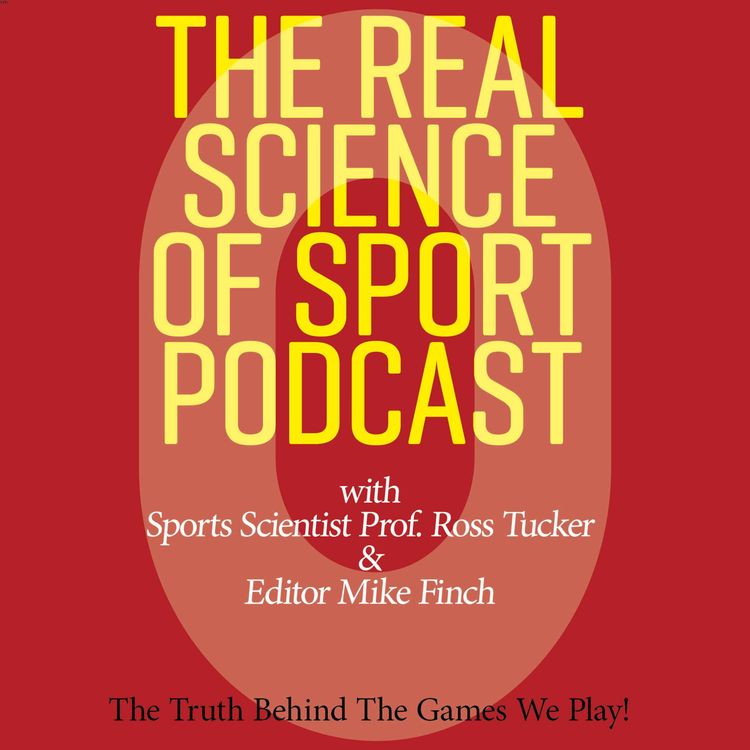
The Real Science of Sport Podcast
Bonus episode: Ross' thoughts on delays and concerns in the IOC Transgender Guidelines
It was recently reported that the IOC’s latest transgender guidelines will be delayed because of “very conflicting opinions”. That is not surprising, as the latest version of the guidelines have been gridlocked for a number of years. However, more tellingly, and potentially concerningly for women's sport, the IOC have indicated that a framework or guidance document for its member federations may shift the prioritization towards inclusion, with fair and meaningful competition something to “bear in mind”. In this bonus episode, exclusive to Patrons, Ross shares some thoughts about this shift, and how it may undermine the integrity of women's sport, and why the balance of imperatives that sport seems so committed to achieving is an impossible, if desirable, task.
More episodes
View all episodes
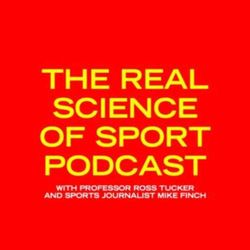
25. The 2024 Sports Year In Review
02:10:21||Season 6, Ep. 25Who were the superstars, and what were the unforgettable moments of 2024? Who failed to launch, and who exceeded expectations? What are your hopes for sport and sports science in 2025? We draw a spectacular sporting year to a close with a look back at the highlights, lowlights, newsmakers and big stories of 2024. In a somewhat tongue-in-cheek "Sporting Awards" show, Mike, Gareth and Ross pick out their winners and losers, and the achievements that got us talking and debating. Inspired by the contributions and nominations from our Discourse community, we make our selections in categories ranging from the Moment of the Year to the Biggest Anticlimax of the last twelve months, with sports science insights and the big sports science stories covered in between.Join DiscourseIf you fancy sports science and sports news conversations with our amazing members, consider a small donation to become a Patron of the site, and get access to our Discourse community.Podcast highlights: Some of the podcasts from 2024 that came up in this show:Dr Joe Warne on the scientific theme of 2024: Can we trust sports science?The Skeptics guide to sports science - Dr Nick Tiller joined us to talk about how marketing undermines sports science, with a little help from sports scientistsAs Gareth noted on the show, the podcast topic that generated the highest volume of Discourse chat was VO2max, your most important training metricProf Louise Burke joined us to talk about why carbohydrates and not fats power most endurance athletes to better performanceProf Stuart Phillips on weight training - the one that changed Mike's exercise training routines.The science of hydration - this is the one that led to a really lively Discourse discussion about the scientific 'robustness' of hydration claims made on this showThe Olympic Controversy podcast recorded at the time of the DSD controversyRuth Chepngetich smashed the women's World Record, and the debate kicked off. We did a podcast on it in OctoberWe named BJSM as "Worst Team of the Year". This is the podcast we did on their shameful stance on women's sport and loss of scientific credibility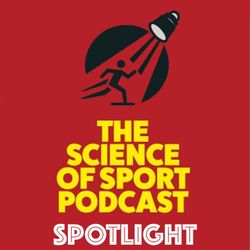
Elite Sport's Race to the Bottom, and Anti-Doping's Scramble for Higher Ground
01:02:09|In this Spotlight edition, Gareth Davies and Ross Tucker dive ever deeper into the abyss of sport's Talent Identification and Development inefficiencies. With a nod to our most recent podcast on Gout Gout's meteoric rise and anticipated trajectory to sprint dominance, we discuss how elite sport 'farms' talent in a 'race to the bottom' that characterises the ruthless pursuit of champions. We discuss the costs this creates, both financial and human, using talent pathway practices in cycling, football, rugby and tennis to illustrate why lost young athletes and inefficiencies are features of the system, rather than 'bugs'. We also discuss the latest developments in the world of anti-doping, where WADA have announced changes to contamination cases and accidental doping, and where the UCI have moved to ban carbon monoxide use for performance enhancement, but not measurement.SHOW NOTES:Join DiscourseIf you fancy a bit of the coaching, sports science and sports news conversations with our amazing members, consider a small donation to become a Patron of the site, and get access to our Discourse community, where you can join like-minded fans and sports enthusiasts to keep the conversation going.The article discussing the retirement of junior cyclists and the ruthless efficiency with which they are replacedA research article exploring how U23 performances predict elite cycling performance, perhaps not surprisingly, as discussed in the showMy 2019 article on the curse of the precocious athleteThe Gout Gout podcast referenced in our Talent discussionsThe very interesting Discourse topic in which Gareth and others talk about the changes in professional cycling (Discourse members only)A news article on WADA's announcement about intended changes to the Anti-Doping Code, including the discussed changes to contaminated product and accidental doping rulesThe UCI "bans" carbon monoxide use for performance enhancement, but not for measurement. Quite how is anyone's guess.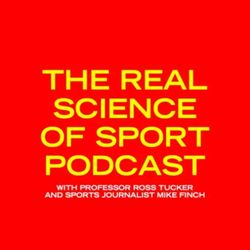
24. Exclusive: Is Australia's New Sprint Sensation the Next Usain Bolt?
01:11:33||Season 6, Ep. 24Gout Gout is a sprint phenom. At only 16, he recently broke the Australian men's 200m record with a stunning 20.04s, second on the all-time list for under-18 sprinters. That followed 10.04 (wind-aided) and 10.17 100m clockings, as the Australian teen continued his meteoric rise to elite adult performances. The manner of his performances, with astonishing finishing speed, has created huge excitement, with anticipation of Bolt-like times and achievements in his future. But, teen prodigies come and go, many falling short of fully delivering on their exceptional promise. In this exclusive interview, his manager and agent James Templeton opens up about Gout's past, present and future, and shares the vision and specific plans he and Gout's coach have for one of the most exciting talents ever seen in the sport. Along the way, we discuss talent identification concepts,and learn lessons from David Rudisha's career about the dangers and traps that can ambush a young athlete, and how they plan to navigate those for Gout. We also discover how Gout Gout is handling new-found fame and being prepared for the hype, with the ultimate goal of taking on the world of sprinting in 2025 and beyond.SHOW NOTES:Join DiscourseIf you fancy a bit of the coaching, sports science and sports news conversations with our amazing members, consider a small donation to become a Patron of the site, and get access to our Discourse community, where you can join like-minded fans and sports enthusiasts to keep the conversation going.Video of Gout Gout's 200m Australian record of 20.04sThe wind assisted 10.04s that Gout ran, with special emphasis on the final 50mThe paper that shows the relatively low conversion of top 100 ranked U18 and U20 athletes into the top 100 adults, and vice-versa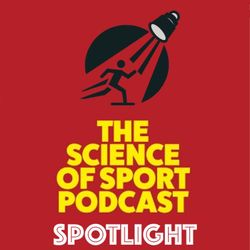
23. What Tennis' Latest Scandal Teaches Us About Doping
58:04||Season 6, Ep. 23World Number Two tennis player Iga Swiatek's positive test for a little-known product called Trimetazidine raises the issue of whether drug testing is going too far. Should there not be a threshold for the level of prohibited substances found in the body? Is there a performance advantage? What fault lies with the athlete? No matter the final outcome, an athlete remains tainted no matter their potential innocence, which could affect performance and sponsorship agreements. In this Spotlight episode, the team discuss the case, its similarities and differences compared to tennis' other high profile doping case, Janik Sinner, and what it means for anti-doping.SHOW NOTES:Join DiscourseIf you fancy a bit of the coaching, sports science and sports news conversations with our amazing members, consider a small donation to become a Patron of the site, and get access to our Discourse community, where you can join like-minded fans and sports enthusiasts to keep the conversation going.The ITA decision statementBBC story on Swiatek's one-month banSwiatek's statement on InstagramThe timeline of Swiatek's doping caseResponse from the manufacturer of the drugArticle on Jack Burke's KOMsWhen Burke broke the Alp d'Huez KOMJack Burke's Strava account
Science of Sport Spotlight 9: To Torque or Not to Torque, energy demands from the Women's Tour, and topical doping debates
01:01:33|In this spotlight episode, Ross and Gareth put some of the interesting discussions from our Discourse community in the spotlight. Gareth, master (and moderator) of Discourse, learned all about high cadence training from the coaches in the Discourse community when he tackled a Zwift cycling programme that had him spinning his legs. We discuss whether high cadence training has merit, or whether we should actually be looking at the other extreme - Torque training, with very low cadence, to develop cycling ability? A fascinating recent paper is the basis for that discussion. We also talk about a paper that documents the remarkable energy costs of cycling in the Tour de France Femmes - an incredible 7500 kCal per day, not met by energy intake in the case study. Finally, we tackle two doping stories. The first is a call by the UCI for WADA to "take a position" on alleged Carbon Monoxide misuse by elite cyclists, and the second is the latest step taken by the Enhanced Games, who, among other things, wish to classify aging as a disease. And they'll pay a cool million to a human who runs a sub-9.58s 100m, powered by any means necessary.Show notesJoin DiscourseIf you fancy a bit of the coaching, sports science and sports news conversations with our amazing members, consider a small donation to become a Patron of the site, and get access to our Discourse community, where you can join like-minded fans and sports enthusiasts to keep the conversation going.The research study that finds that low cadence training enhances performance more than self-selected (high) cadence training during an 8-week polarized training blockThe case study of energy demands in an elite woman in the Tour de FranceThe UCI calls on WADA to take a position on Carbon Monoxide useThe Enhanced Games message to Robert F Kennedy to declare war on aging
22. How Far Can You Push the Human Body? Lessons from a Royal Marine Doctor
01:37:51||Season 6, Ep. 22Pushing the body to its limits can be the difference between life and death for a Royal Marine. So how far can you push recruits and what lessons can sport learn from the training they endure? In this interview with Dr Ross Hemingway, a Sports & Exercise Medicine Doctor at the Commando Training Centre for Royal Marines in the UK, we take a fascinating look at everything from heat illnesses to fatigue and injuries experienced by some of the fittest men and women on the planet. Hemingway explains how Marines are assessed and tells stories of recruits who overcome extreme hardship in their quest to be among the military elite.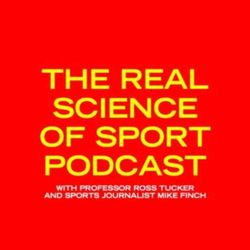
21. Is the Credibility of Sports Science's Most Respected Journal Under Threat?
01:10:02||Season 6, Ep. 21At the recent British Association of Sports & Exercise Medicine (BAsem) conference, the world's most respected journal in sports science - the British Journal of Sports Medicine (BJSM) - openly promoted a presentation done on the trans issue by the author of the controversial book Open Play: The Case For Feminist Sport, Dr Sheree Bekker. In the presentation, Bekker challenges the ideas around transgender sporting advantage despite persuasive scientific evidence to the contrary, raising the question of whether the BJSM has failed in its mandate to support robust scientific content. The team break down what the BJSM's role in sports science should be, analyse some of the outlandish statements made in the presentation and discuss the implications of what happens if credibility is lost.SHOW NOTES:The tweet by the BJSM on the presentation done by Dr BekkerThe photo claiming to show the TWSA and Feminist Approach to the gender debateDr Sheree Bekker's websiteA link to the BJSM websiteRoss's X thread reacting to the presentation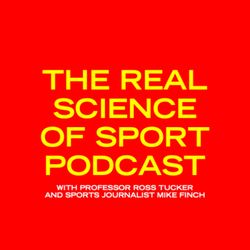
20. Chepng'etich's Marathon World Record Analysis: Too Good To Be True?
01:23:32||Season 6, Ep. 20When Kenyan Ruth Chepng'etich took nearly two minutes off the women's marathon world record, the sporting world was aghast. How did she do it? Shoe tech, nutrition, race tactics? With a doping cloud hanging over Kenyan athletics, it's easy to see why so many are sceptical. Join Prof. Ross Tucker and sports journalist Mike Finch as they assess every aspect of the run in an effort to explain one of the most astonishing running performances in history.SHOW NOTESThe paper by Mason et al on how the shoes have boosted women’s distance runners more then men.The Joubert & Jones paper that compares different shoes, including Figure 2 that shows the individual variation between models of the same brand.Another similar paper on individual variability by Knopp et al.For analysis of the performances since super shoes were introduced.A piece by Toni Reavis in defence of Chepngetich’s performance.The article by Amby Burfoot that Reavis mentions. Amby does not hold back. The AIU list of Kenyans currently serving doping bans. You can count the drug type to see if the show conversation was accurate. The CAS Decision on Rhonex Kipruto, in which his doping is described as a “sophisticated doping regime.
20. DISCOURSE SPECIAL: Is Elite Cycling Safe Enough? / Rugby's Smart Mouthguards / Is Sinner Guilty of Doping? and Much More
01:53:17||Season 6, Ep. 20After a post-Olympic break the team wrap up all the latest hot topics and news from our Discourse channel. We share details of how the rollout of rugby's smart mouthguards is going, discuss Jakob Ingebritgsen's crazy half marathon debut and how best to use sport science to help a small-budget cycling team. We also explain the ongoing doping saga of tennis world number one Jannik Sinner and ask if the world governing body for cycling, the UCI, is doing enough to ensure the safety of riders after the death of an 18-year-old at the World Championships.SHOW NOTES Jon Wertheim's excellent piece on the Sinner doping scandal from SI.comThe Guardian's piece on the death of Muriel FurrerIngebrigtsen's crazy half marathon debut